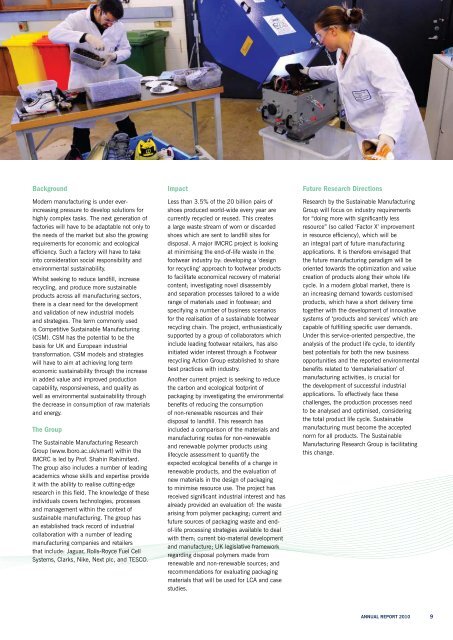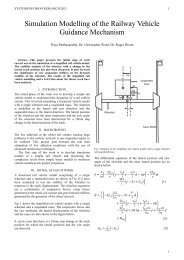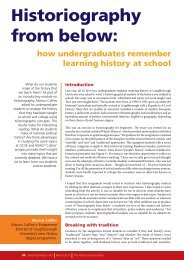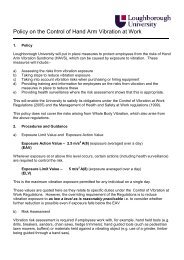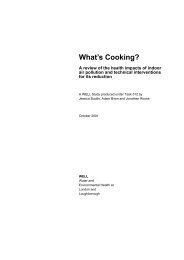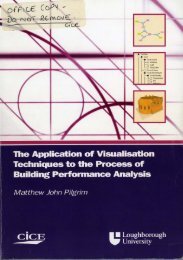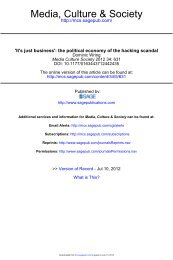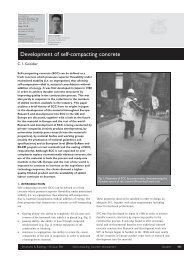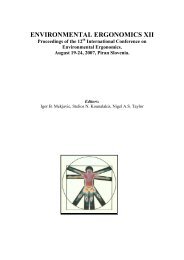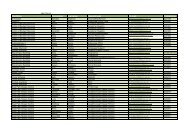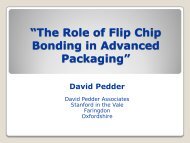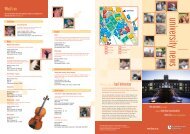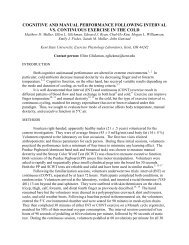ANNUAL REPORT 2010 - Loughborough University
ANNUAL REPORT 2010 - Loughborough University
ANNUAL REPORT 2010 - Loughborough University
You also want an ePaper? Increase the reach of your titles
YUMPU automatically turns print PDFs into web optimized ePapers that Google loves.
Background<br />
Modern manufacturing is under everincreasing<br />
pressure to develop solutions for<br />
highly complex tasks. The next generation of<br />
factories will have to be adaptable not only to<br />
the needs of the market but also the growing<br />
requirements for economic and ecological<br />
efficiency. Such a factory will have to take<br />
into consideration social responsibility and<br />
environmental sustainability.<br />
Whilst seeking to reduce landfill, increase<br />
recycling, and produce more sustainable<br />
products across all manufacturing sectors,<br />
there is a clear need for the development<br />
and validation of new industrial models<br />
and strategies. The term commonly used<br />
is Competitive Sustainable Manufacturing<br />
(CSM). CSM has the potential to be the<br />
basis for UK and European industrial<br />
transformation. CSM models and strategies<br />
will have to aim at achieving long term<br />
economic sustainability through the increase<br />
in added value and improved production<br />
capability, responsiveness, and quality as<br />
well as environmental sustainability through<br />
the decrease in consumption of raw materials<br />
and energy.<br />
The group<br />
The Sustainable Manufacturing Research<br />
Group (www.lboro.ac.uk/smart) within the<br />
IMCRC is led by Prof. Shahin Rahimifard.<br />
The group also includes a number of leading<br />
academics whose skills and expertise provide<br />
it with the ability to realise cutting-edge<br />
research in this field. The knowledge of these<br />
individuals covers technologies, processes<br />
and management within the context of<br />
sustainable manufacturing. The group has<br />
an established track record of industrial<br />
collaboration with a number of leading<br />
manufacturing companies and retailers<br />
that include: Jaguar, Rolls-Royce Fuel Cell<br />
Systems, Clarks, Nike, Next plc, and TESCO.<br />
Impact<br />
Less than 3.5% of the 20 billion pairs of<br />
shoes produced world-wide every year are<br />
currently recycled or reused. This creates<br />
a large waste stream of worn or discarded<br />
shoes which are sent to landfill sites for<br />
disposal. A major IMCRC project is looking<br />
at minimising the end-of-life waste in the<br />
footwear industry by: developing a ‘design<br />
for recycling’ approach to footwear products<br />
to facilitate economical recovery of material<br />
content; investigating novel disassembly<br />
and separation processes tailored to a wide<br />
range of materials used in footwear; and<br />
specifying a number of business scenarios<br />
for the realisation of a sustainable footwear<br />
recycling chain. The project, enthusiastically<br />
supported by a group of collaborators which<br />
include leading footwear retailers, has also<br />
initiated wider interest through a Footwear<br />
recycling Action Group established to share<br />
best practices with industry.<br />
Another current project is seeking to reduce<br />
the carbon and ecological footprint of<br />
packaging by investigating the environmental<br />
benefits of reducing the consumption<br />
of non-renewable resources and their<br />
disposal to landfill. This research has<br />
included a comparison of the materials and<br />
manufacturing routes for non-renewable<br />
and renewable polymer products using<br />
lifecycle assessment to quantify the<br />
expected ecological benefits of a change in<br />
renewable products, and the evaluation of<br />
new materials in the design of packaging<br />
to minimise resource use. The project has<br />
received significant industrial interest and has<br />
already provided an evaluation of: the waste<br />
arising from polymer packaging; current and<br />
future sources of packaging waste and endof-life<br />
processing strategies available to deal<br />
with them; current bio-material development<br />
and manufacture; UK legislative framework<br />
regarding disposal polymers made from<br />
renewable and non-renewable sources; and<br />
recommendations for evaluating packaging<br />
materials that will be used for LCA and case<br />
studies.<br />
Future Research Directions<br />
Research by the Sustainable Manufacturing<br />
Group will focus on industry requirements<br />
for “doing more with significantly less<br />
resource” (so called ‘Factor X’ improvement<br />
in resource efficiency), which will be<br />
an integral part of future manufacturing<br />
applications. It is therefore envisaged that<br />
the future manufacturing paradigm will be<br />
oriented towards the optimization and value<br />
creation of products along their whole life<br />
cycle. In a modern global market, there is<br />
an increasing demand towards customised<br />
products, which have a short delivery time<br />
together with the development of innovative<br />
systems of ‘products and services’ which are<br />
capable of fulfilling specific user demands.<br />
Under this service-oriented perspective, the<br />
analysis of the product life cycle, to identify<br />
best potentials for both the new business<br />
opportunities and the reported environmental<br />
benefits related to ‘dematerialisation’ of<br />
manufacturing activities, is crucial for<br />
the development of successful industrial<br />
applications. To effectively face these<br />
challenges, the production processes need<br />
to be analysed and optimised, considering<br />
the total product life cycle. Sustainable<br />
manufacturing must become the accepted<br />
norm for all products. The Sustainable<br />
Manufacturing Research Group is facilitating<br />
this change.<br />
AnnuAl RepoRt <strong>2010</strong> 9


